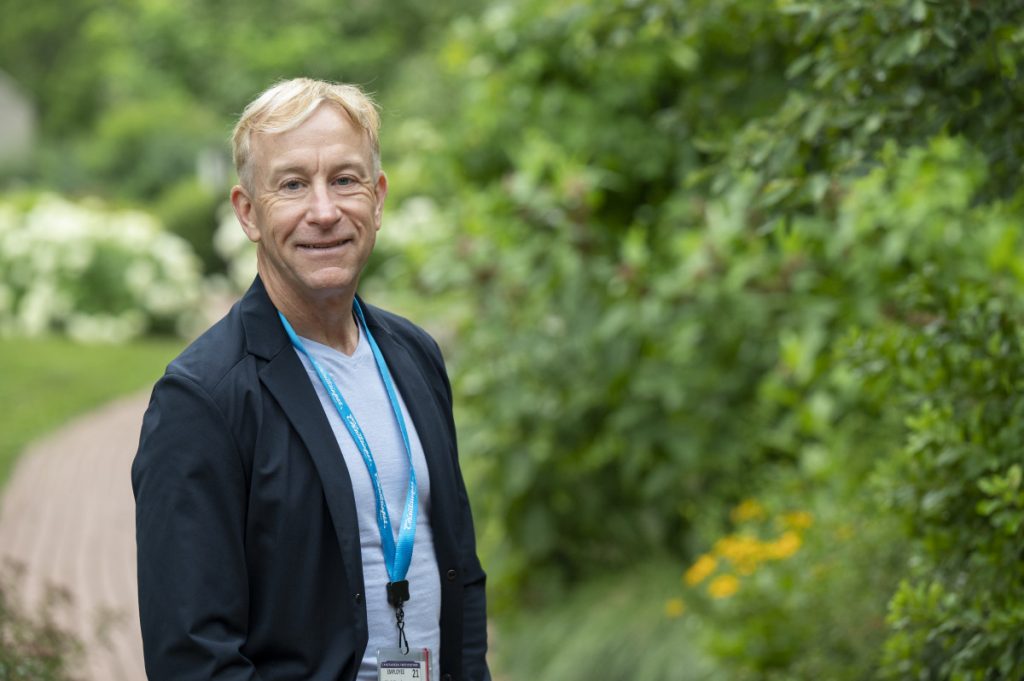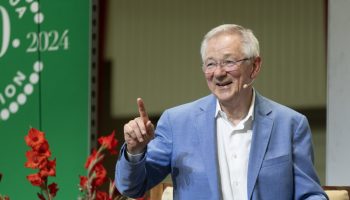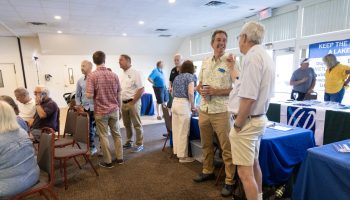SARAH VEST – STAFF WRITER

Mark Wenzler has had a long career combating climate change, most recently serving as senior vice president at the National Parks Conservation Association. He now steps into the role of inaugural director of the Chautauqua Climate Change Initiative.
“This job is bringing me back to the actual work that I love,” Wenzler said.
According to Wenzler, his role at the National Parks Conservation Association was “completely different” from what he has brewing for the Initiative. There he was in a managerial position running conservation programs around the country — while in Chautauqua he is going to have the opportunity to be more hands-on.
Wenzler said he learned a lot from his work with the National Parks Conservation Association. The more he is at Chautauqua, the more crossover he notices between the organizations’ approaches.
The National Park Conservation Association not only advocates for the conservation of places like Yosemite, Yellowstone and Acadia, but also works to inform and inspire the public on issues that affect their protection. This model of educating people is one that Wenzler sees working well for the Institution. He wants to harness all the goodwill and love Chautauquans have for the grounds to consider ways to protect this land and the planet for the long term.
“I love that model because it takes it out of the realm of politics, where I think climate change (conversation) often gets stopped,” Wenzler said.
The Initiative is designed to elevate climate change as a key issue that the Institution is uniquely positioned to address through interdisciplinary and multigenerational programs. It is the first major initiative that will be active not only during the traditional Summer Assembly but year-round and for multiple years, and it launches with three primary areas of focus: education, stewardship and justice.
These last few weeks have been Wenzler’s first on the grounds; he has been spending his time listening, learning and absorbing as much as he can.
“I want to get to know the community here, because I think it’s really going to help me design a much more effective program collaboratively with my colleagues — here with the community — if I have a better understanding of the work that they do, the concerns that they have and the hopes that they have for this initiative,” Wenzler said.
He wants to get a feel for the environment at Chautauqua before he begins to establish any firm ideas and plans about what the Initiative should do and be. However, this doesn’t mean he has no idea what he wants to do moving forward.
The framework of Wenzler’s plan folds out into three levels that come together to create a cohesive vision for the future.
The first level includes setting roots on the grounds by seeing what the Institution can do within its own operations to be a model of sustainability. For example, he is thinking about how the Institution can reduce emissions from transportation vehicles, how to achieve zero net energy expenditure and how to be stewards of Chautauqua Lake.
“If we are going to communicate well beyond the grounds about climate change, then let’s make sure that we are doing what we can do here,” Wenzler said.
The Institution and community already have sustainability practices in place, and Wenzler said he was surprised and thrilled that there was already such a strong foundation for him to build on. When people take a walk around the grounds, they see purple martin houses and bat boxes. They can go sit in the rain gardens, butterfly gardens and down by the lake. There are even practices in place that are not obvious at first glance. For example, Wenzler said, the Institution purchases all of its energy from renewable resources.
“This is clearly a place that cares about … being good stewards of the environment,” Wenzler said. “Just because you don’t see solar panels everywhere doesn’t mean that Chautauqua isn’t deeply committed to renewable energy.”
Wenzler’s plans don’t stop there, though. The Initiative aims to bring in the larger community around the Institution, so he’s actively reaching out to and engaging with stakeholders around the lake.
Wenzler wants to establish this relationship so that all of the communities that rely on Chautauqua Lake can work together to restore it to good ecological health. While some communities rely on the lake for drinking water, the entire county relies on it for recreation and as an economic driver.
Wenzler wants to get surrounding communities involved for the long term by looking at current environmental models so that the lake can be enjoyed for generations to come. It is important to begin thinking ahead so that everyone can be making decisions that are in the interest of protecting this natural resource.
The third level involves the national, and even the international audiences that the Institution is able to reach with the current programming through the CHQ Assembly Video Platform. Wenzler wants to engage these audiences on climate change and use the Institution’s voice to inspire action to address the existential threat to the planet.
Wenzler is looking forward to unfolding this framework with the help of his colleagues and to building components in each level. He won’t be able to do it all on his own and ultimately what they are able to create together will be “more powerful and more sustainable.”
“From our very first conversations, it was clear Mark saw the Climate Change Initiative as an opportunity to mobilize all of Chautauqua,” said Matt Ewalt, vice president and Emily and Richard Smucker Chair for Education, “from colleagues and programs across departments, to dedicated Chautauquans on grounds and across the country, so that we bring all of our resources and energy to this most important effort.”
The initial phases of the Chautauqua Climate Change Initiative have been funded by philanthropic gifts to Chautauqua from Peter Nosler, Julie Veitch and Jane Batten.
“It’s really good to see how deeply committed people are, no matter what their role is in the organization,” Wenzler said.
He has already started working on getting himself involved with the programming on the grounds. On Tuesday he moderated Elizabeth Kolbert’s morning lecture, then held a special conversation with the environmental journalist for Special Studies. Last weekend, Wenzler planned the CLSC Young Readers activity based on Week Two’s book Bridge to Terabithia, where the kids had the opportunity to head down to the ravine and create their own kingdoms.
“Talk to any parent, and they will tell you that it’s often their kids who bring home ideas about recycling, about how we need to be more sustainable in our households,” Wenzler said. “They’re really concerned about our future and their future.”
Wenzler thinks that engaging kids who are “naturally curious” is a great way to work toward the educational goals of the Initiative, and engage Chautauqua families in sustainable living.
He said he is optimistic for the future of the Initiative because the nature of Chautauqua inspires people to think bigger and better for so many other aspects of the world we live in. The Initiative brings issues from spanning the world right to the steps of people’s front porches.
“When it becomes about the place that you love, and that we all care about, I think we have a much greater ability to bring people together around that positive action,” Wenzler said. “We saw that in the national parks, time and time again, and I think we will see that here at Chautauqua. We do see it here.”




